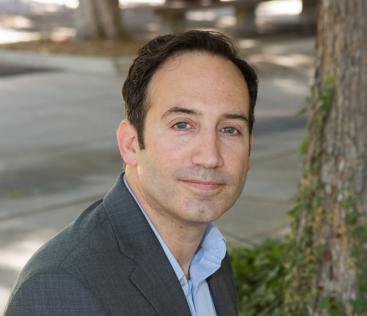
To Richard M. Carpiano, a pandemic is just as much of a social science issue as it is a medical one. A professor of public policy and sociology at the University of California, Riverside, Carpiano specializes in public health and medical sociology, analyzing how various social factors impact population health around the world.
Carpiano began studying trends in vaccine uptake after a 2015 measles outbreak at Disneyland Park in Anaheim affected 147 people, many of them unvaccinated. He continues to study vaccine hesitancy, or the reasons underlying whether parents might choose not to vaccinate their children, and he has taken a keen interest in how anti-vaccine activists have “moved into the space around COVID-19” and found allies when it comes to broader issues such as government overreach, he said.
One of the most concerning elements of the coronavirus pandemic, according to Carpiano, has been its politicization. In particular, cherry-picking scientific findings, or using the lens of science to push an agenda, has had dire effects on people’s risk perceptions.
“Polls have shown there are definite demographic and partisan differences when it comes to people’s perceived risk of COVID-19,” he said. “That, to me, is the most insidious impact of the misinformation people are receiving, because not only will it undermine our best efforts to protect people, but it’ll also sow political unrest or discord around public health and governmental decision-making.”
Add to the mix a lack of consistent messaging from elected and other public officials, as well as social media mechanisms that allow information to travel “almost faster than the virus,” and you have the recipe for an ideal environment for misinformation to proliferate, thus weakening response, Carpiano said. With eyes already on the next global health event, he offered five recommendations to ensure a more coordinated, successful response to future pandemics:
1. Maintain a consistent messaging strategy for elected and other public officials: Government officials should avoid politicizing future pandemics by working together to adopt a clear and consistent messaging strategy around them, Carpiano said. Despite some obvious outliers, the majority of people have abided by certain protective measures over the course of the coronavirus pandemic, he added. This suggests most people have remained mindful of protecting themselves and others by following the recommendations of scientists and other experts — and are likely to continue to do so given the proper guidance.
“Clear and consistent communication, even when it has to be changed and updated, is essential,” Carpiano said. “California has done a lot of things right; even when Gov. Newsom has been wrong, he’s admitted it, and that’s allowed him to engender a lot of trust with the public. The takeaway is that people will understand mistakes when politicians own up to them — they shouldn’t be afraid of damaging their credibility.”
2. Develop a more effective marketing approach for promoting public health protocols and protective measures: Carpiano noted his disappointment with what he calls the “marketing approach” around COVID-19. He said public health and other agencies should be investing in advertisements and other forms of direct communication to motivate people to wear masks or maintain physical distancing, for example.
“Generally, I hate the idea of celebrities being the face of science, but I don’t think it would be a bad thing to have celebrities or other trusted messengers on TV talking about the benefits of wearing a mask,” he said. “That’s the kind of move that needs to be done at the start of a recommendation or order and as part of an ongoing ‘booster’ strategy to reinforce to the public the importance of the activity, sort of like with some vaccines we receive. The important thing is: It can’t be boring or else people will tune out. Many people are already distrustful of vaccines or of the current administration, so having a consistent messaging strategy and the right people to deliver it would go a long way toward building trust with the public when it comes to a safe, effective vaccine and/or other therapies, as well as guidelines or recommendations such as sheltering in place and mask wearing.”
3. Have experts work with the media to improve coverage of science: One reason why misinformation has proliferated in recent months is because the media has too often rushed coverage of scientific “discoveries” without respecting the usual checks and balances under which the scientific community operates, Carpiano said. This has led to an overabundance of coverage of data and findings that haven’t been properly vetted and often end up debunked, which in turn risks increasing public confusion and skepticism.
“Professional science organizations and medical associations, among other groups, could be helpful here by sitting down with members of the media and offering some guidelines for how best to report science, including how not to present misinformation through false balance with accurate facts,” Carpiano said. “We really need our reporters to put the good information first and the misinformation second, if they need to include mention of the misinformation at all.”
In addition, Carpiano said reporters should be advised to be wary of where they’re receiving their information — and from whom.
“They might be seeing press releases from pharmaceutical companies, for example, or from academics who are looking to get attention,” he explained. “Reporting certain ‘findings’ too early could really undermine faith in a vaccine and trust in other sorts of evidence-based initiatives that public health officials might be trying to implement.”
4. Form a coronavirus review committee: Carpiano cited the National Commission on Terrorist Attacks Upon the United States, also known as the 9/11 Commission, when describing the kind of review committee that should be set up in the aftermath of COVID-19 to help public officials better understand what happened on a national level and why. Formed in 2002, the independent, bipartisan commission was tasked with preparing a complete account of the circumstances surrounding the Sept. 11, 2001, terrorist attacks and providing recommendations to guard against future attacks.
“The history of the U.S. offers many examples where policymakers needed to learn from mistakes,” Carpiano said. “Disasters often have to happen for us to learn, it seems, instead of us thinking proactively about how to prepare for those situations before they happen. When it comes to the coronavirus pandemic, we need to have a high-level review of what happened, why things happened the way they did, and which checks and balances or preparations weren’t in place — essentially, how did our response unfold and how can we do things better?”
5. Establish a more coordinated focus on public health funding: Public health has been underfunded for years, Carpiano said, much to the public’s detriment. As a result, we need to be proactively thinking about different ways to improve the public health system at the federal, state, and local levels, particularly when it comes to infectious disease surveillance and outbreak preparedness and management.
“We also need to better plan for potential blowback against public health officials,” he added. “Recently, there has been talk about protecting these people the same way we do judges or other high-ranking officials, because many have been on the receiving end of threats or other forms of intimidation, and that most definitely undermines public health.”
Header image by Logan Weaver via Unsplash




